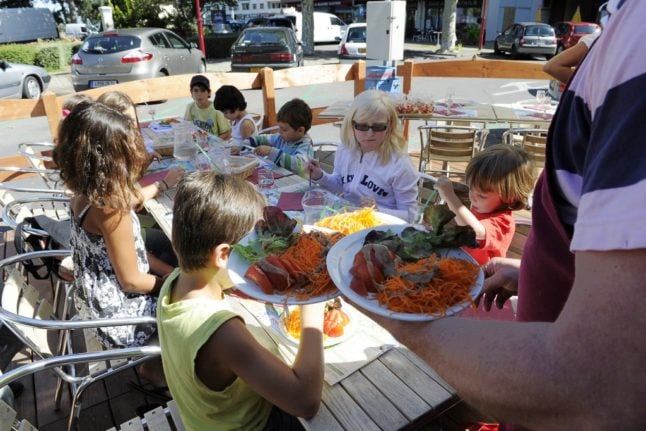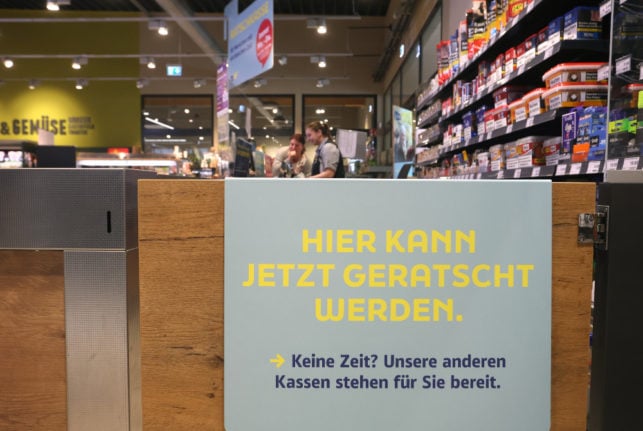Beneath a headline pandering to Middle England prejudice – “The one thing I don’t miss about our family holidays in France? The French” (paywalled) – a Daily Telegraph writer announced that her Francophile days were over.
Georgina Fuller told in a barbed column this week of grim restaurant experiences south of the Dordogne where French diners would tut-tut at her “unruly brood” of three small children.
The details were enough to persuade someone editing her words to sum them up as an argument that few countries are less child-friendly than France.
The writer complained that restaurants failed to open before 7pm. There were “no such things as a kids’ menu”. Painfully stuck in the mind was the memory of feeling mortified when her eldest child demanded fish fingers next to a table where a French boy of around four was happily tucking into a bowl of moules.
Criticising the French for not tolerating badly behaved children in restaurants. Whatever next? pic.twitter.com/rGLZ6oJJ1w
— Kim Willsher (@kimwillsher1) April 1, 2021
Unconvincingly presented by Ms Fuller as the light-hearted observations of one whose late mother had a fondly remembered home in Aquitaine, this was journalistic feat taking us back decades to lamb wars and the Sun’s “hop off you frogs” campaign.
And it took me back to the dying days of my own Telegraph career. At a leaving party in the paper’s grand apartment-cum-office overlooking the Tuileries gardens in Paris, the British ambassador kindly noted that my work revealed an understanding of, even a liking for, the French. “No wonder they fired you,” a fellow-journalist teased me later.
He was only half-joking. This week’s piece in the Telegraph confirmed that when stuck for an idea, a certain kind of columnist can usefully fill the void with a spot of frog-bashing,
In my own experience, it is a peculiarly British or rather English trait to gaze across the Channel in gleeful search of any opportunity to mock or belittle.
READ ALSO:
OPINION: Cheap French-bashing is an old tune from British press and politicians
It can work both ways, but only up to a point. There is what the former president Jacques Chirac described to me as “l’amour violent”, not so much a rough love affair as a tempestuous relationship between near neighbours with a long history of falling out but also much to admire and respect in one another.
Chirac may have been overheard saying the UK’s only contributions to Europe were bad food and mad cow disease. But more broadly, I see little evidence of reciprocal kneejerk disdain for all things British, whereas the “love France, hate the French” line is trotted out at regular intervals, even when there are no disputes over a Covid vaccine or fishing grounds.
Some expats have been known to indulge. Several years ago, a Home Counties woman living reluctantly in northern Brittany explained her unwillingness to learn French. “Who on earth would I want to speak it to?” she asked as if it were the most natural reason imaginable for stubbornly resisting the integration that enriches so many lives – including, to be fair, those led by her more open-minded husband and son.
The notion that the French are not child-friendly, least of all in restaurants, is surely risible. There is certainly a case for suggesting their children are better behaved when eating out. This, to some extent, is because it is entirely normal to be included in such family outings from an early age.
Why wouldn’t the four-year-old on the next table be enjoying his mussels? In resorts close to my home in the Var, I see children of a similar age happily dissecting shellfish. A snail producer in Loire-Atlantique once told me most French children had regularly eaten the delicacy by the time they were six or seven. There are children’s menus in France now but when my own children were small, they were content with shares of their parents’ food.
Georgina Fuller quotes with apparent approval a French acquaintance who felt he and his siblings were more repressed than British counterparts given carte blanche to express themselves freely.
“Some of the silent children I saw in restaurants and local towns in France seemed almost Victorian in comparison to our rambunctious brood,” she writes.
Such generalisations are best treated as suspect. Even my late French father-in-law was accurate about only some of the British with his favoured mantra: “The French live to eat, you eat to live.”
But if children, middle class or otherwise, are encouraged to regard fatty processed food as the height of their dining ambition, and maybe grab packets of crisps and sweet fizzy drinks between meals, it is no wonder they recoil from anything more interesting or nutritious.
The Fuller children may indeed flourish away from disapproval in France, when taken instead to Devon and to other continental destinations such as Ibiza, the Netherlands and Portugal.
But their mother should not be surprised that the response of French people who have read of her resolve to steer clear of France can best be summed as bon débarras.
Colin Randall was the Daily Telegraph’s former Paris bureau chief and is now a freelance journalist and divides his time between London and the south of France.





 Please whitelist us to continue reading.
Please whitelist us to continue reading.
Let’s face it. We are not child friendly towards the British children we see rampaging through shops and restaurants because the majority are out of control and lack the basic social skills because their parents also lack them.
We moved here in 2019 from Vancouver with an 8 and a 5 year old. Parenting has its differences– like how children seem to all tolerate being dressed in business-casual from age 3 up. But being in family spaces, you see kids running, laughing and shouting just as much. And parents being even more patient and attentive than the average suburban parent in Canada, in my opinion.
Thank you to Boggy’s comment.
I appreciate this response to offensive scrappy article in Telegraph. Yes, “bon débarras.”
Thank you for taking the time to reply.
A poor article in The Telegraph and a decent, measured response from The Local. I’ve had a house in France for nearly 20 years and when we first holidayed there, our kids were 4 and 6 respectively. There’s a big difference between an English pub garden and a French restaurant; the former is more casual – by a distance. So it has always been a simple matter of respecting the values of the places where we’ve eaten. Looking forward to eating in French restaurants again as soon as possible after May 17!
Don’t rise to the provocation.
Since Brexit the English press (Express, Telegraph, Mail etc) have published a series of anti-Europe articles which either highlight the victimization of the UK by the EU or which highlight any negative comments within or about Europe.